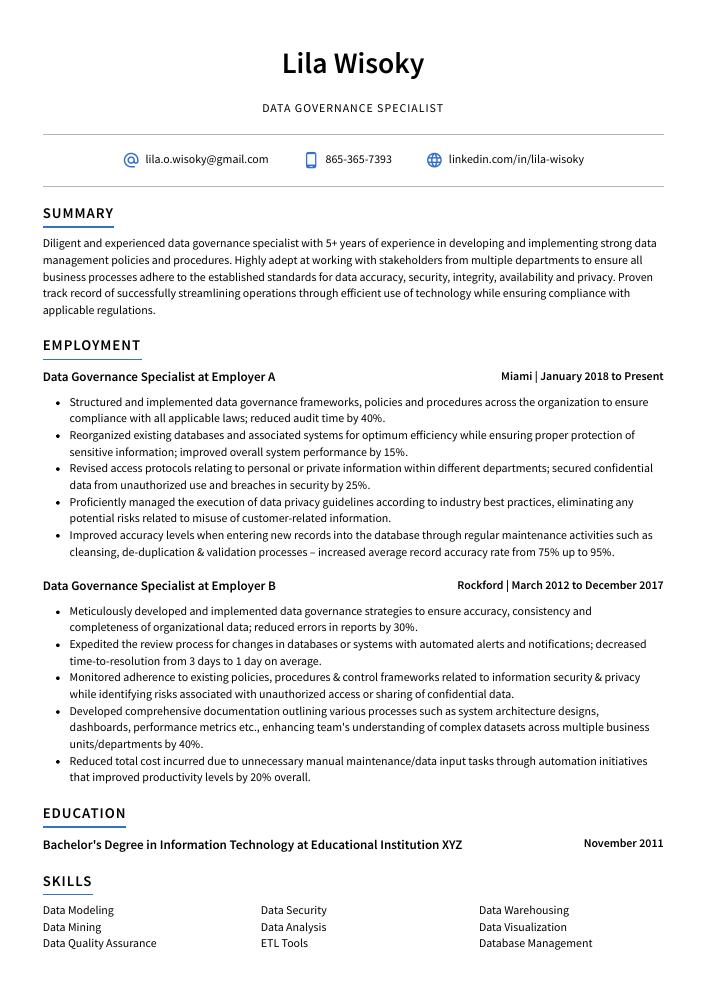Data Governance Specialist Resume Guide
Data governance specialists are responsible for overseeing an organization’s data management system, ensuring that it is compliant with regulations and policies. They also monitor the accuracy of all data being collected or stored by the company, as well as develop strategies to ensure secure storage and access to this information.
Data governance is your specialty, but hiring managers don’t know that yet. To let them know what you can do and how you stand out from the competition, it’s important to create a resume that highlights all of your accomplishments in this field.
This guide will walk you through the entire process of creating a top-notch resume. We first show you a complete example and then break down what each resume section should look like.
Table of Contents
The guide is divided into sections for your convenience. You can read it from beginning to end or use the table of contents below to jump to a specific part.
Data Governance Specialist Resume Sample
Lila Wisoky
Data Governance Specialist
lila.o.wisoky@gmail.com
865-365-7393
linkedin.com/in/lila-wisoky
Summary
Diligent and experienced data governance specialist with 5+ years of experience in developing and implementing strong data management policies and procedures. Highly adept at working with stakeholders from multiple departments to ensure all business processes adhere to the established standards for data accuracy, security, integrity, availability and privacy. Proven track record of successfully streamlining operations through efficient use of technology while ensuring compliance with applicable regulations.
Experience
Data Governance Specialist, Employer A
Miami, Jan 2018 – Present
- Structured and implemented data governance frameworks, policies and procedures across the organization to ensure compliance with all applicable laws; reduced audit time by 40%.
- Reorganized existing databases and associated systems for optimum efficiency while ensuring proper protection of sensitive information; improved overall system performance by 15%.
- Revised access protocols relating to personal or private information within different departments; secured confidential data from unauthorized use and breaches in security by 25%.
- Proficiently managed the execution of data privacy guidelines according to industry best practices, eliminating any potential risks related to misuse of customer-related information.
- Improved accuracy levels when entering new records into the database through regular maintenance activities such as cleansing, de-duplication & validation processes – increased average record accuracy rate from 75% up to 95%.
Data Governance Specialist, Employer B
Rockford, Mar 2012 – Dec 2017
- Meticulously developed and implemented data governance strategies to ensure accuracy, consistency and completeness of organizational data; reduced errors in reports by 30%.
- Expedited the review process for changes in databases or systems with automated alerts and notifications; decreased time-to-resolution from 3 days to 1 day on average.
- Monitored adherence to existing policies, procedures & control frameworks related to information security & privacy while identifying risks associated with unauthorized access or sharing of confidential data.
- Developed comprehensive documentation outlining various processes such as system architecture designs, dashboards, performance metrics etc., enhancing team’s understanding of complex datasets across multiple business units/departments by 40%.
- Reduced total cost incurred due to unnecessary manual maintenance/data input tasks through automation initiatives that improved productivity levels by 20% overall.
Skills
- Data Modeling
- Data Security
- Data Warehousing
- Data Mining
- Data Analysis
- Data Visualization
- Data Quality Assurance
- ETL Tools
- Database Management
Education
Bachelor’s Degree in Information Technology
Educational Institution XYZ
Nov 2011
Certifications
Certified Data Governance Professional
Data Governance Institute
May 2017
1. Summary / Objective
The summary/objective at the top of your resume is like an elevator pitch – it gives a brief overview of who you are and why you would be a great fit for the role. Here, you can highlight your most impressive qualifications such as certifications in data governance or privacy compliance, experience developing policies and procedures to ensure data security, and success leading teams through complex projects.
Below are some resume summary examples:
Proficient data governance specialist with 8+ years of experience creating and implementing data structuring, archiving, and security protocols. Experienced in leading cross-functional teams to ensure the accuracy, consistency, quality control and reliability of corporate information systems. Looking forward to joining ABC Corp as a data governance specialist where I can leverage my expertise in developing effective policies that protect customer privacy while ensuring regulatory compliance.
Enthusiastic data governance specialist with 5+ years of experience developing and implementing data policies, standards, and procedures. At XYZ Corporation implemented a comprehensive data cataloging system that improved the accuracy of reporting by over 90%. Developed automated processes to monitor compliance across multiple departments. Passionate about utilizing my expertise in data policy development to ensure maximum efficiency in your organization’s data operations.
Talented data governance specialist with 4+ years of experience developing and implementing data quality standards, policies, procedures, and processes. Highly experienced in streamlining the flow of information between departments while utilizing cutting-edge technologies to ensure compliance with all applicable laws & regulations. Looking to join ABC Tech as a Data Governance Specialist to help maintain an efficient data ecosystem for their global clients.
Well-rounded data governance specialist with 5+ years of experience in data analysis, management and compliance. Established a successful data security policy at XYZ that reduced the risk of breaches by 50%. Experienced in developing policies for collecting, storing and utilizing personal information to meet legal requirements. Skilled at handling sensitive customer information while ensuring privacy protection as well as accuracy and reliability of data.
Reliable and experienced data governance specialist with 7+ years of experience in the financial services industry. Proven track record for developing and implementing effective policies, procedures, and controls to ensure compliance with corporate data management standards. Skilled at managing complex projects from concept to completion within budget constraints. Looking to join ABC Bank as their next Data Governance Specialist.
Seasoned data governance specialist with 8+ years of experience in data analysis, architecture, and security. Proven track record of developing efficient processes to collect, analyze, and protect large datasets. At ABC Inc., led the implementation of a comprehensive data management strategy that improved customer service satisfaction by 25%. Skilled at crafting effective policies for compliance with GDPR/CCPA regulations.
Passionate data governance specialist with 5+ years of experience in ensuring the accuracy, consistency and completeness of organizational data. Proven track record for developing effective data governance policies that ensure compliance across multiple departments and divisions. Looking to join ABC Company as a Data Governance Specialist to help drive digital transformation initiatives through improved data quality.
Detail-oriented data governance specialist with 8+ years of professional experience in data analysis, process improvement, and auditing. A proven track record of developing successful strategies to ensure compliance with regulations and standards across various industries. Seeking to bring my expertise to ABC Inc., where I can help implement best practices for managing sensitive information assets.
2. Experience / Employment
The work history/experience section is where you talk about your past roles. It should be written in reverse chronological order, meaning that the most recent job is listed first.
Stick to bullet points when writing this section; it makes it easier for the reader to take in what you have to say quickly and accurately. When describing each role, make sure you provide detail on what tasks were completed and any results achieved from them.
For example, instead of saying “Developed data governance policies,” you could say, “Created a comprehensive set of data governance policies which resulted in improved accuracy across all departments by 10%.”
To write effective bullet points, begin with a strong verb or adverb. Industry specific verbs to use are:
- Monitored
- Implemented
- Analyzed
- Assessed
- Evaluated
- Documented
- Enforced
- Developed
- Resolved
- Investigated
- Coordinated
- Optimized
- Streamlined
- Automated
- Communicated
Other general verbs you can use are:
- Achieved
- Advised
- Compiled
- Demonstrated
- Expedited
- Facilitated
- Formulated
- Improved
- Introduced
- Mentored
- Participated
- Prepared
- Presented
- Reduced
- Reorganized
- Represented
- Revised
- Spearheaded
- Structured
- Utilized
Below are some example bullet points:
- Formulated data governance processes and policies for a team of 15 data analysts, ensuring compliance with industry regulations and improving operational efficiency by 22%.
- Assessed organizational data usage through regular audits to identify security vulnerabilities; provided actionable advice to senior management on how best to mitigate risks.
- Advised stakeholders on gathering accurate business intelligence from existing datasets, resulting in the successful implementation of five new initiatives within six months.
- Demonstrated strong problem-solving skills when resolving issues relating to the accuracy, integrity & availability of corporate information; improved customer satisfaction levels by 11% year over year.
- Successfully led an interdisciplinary team in conducting market research activities that identified opportunities for product development & revenue generation worth $1M+.
- Facilitated the development of comprehensive data governance policies and procedures, resulting in improved accuracy and completeness of corporate data sets by 25%.
- Actively monitored levels of compliance to established rules and regulations across various business units; identified non-compliance issues within 24 hours on average.
- Enforced proper use of data privacy standards to ensure security protection against unauthorized access or manipulation by external parties.
- Presented results from audits conducted at regular intervals before the executive team, helping them gain a better understanding of the company’s overall approach towards enterprise-wide risk management systems related to data governance operations.
- Implemented proactive measures such as creating dashboards for tracking progress on user requests & system activities with an aim to reduce response time by 40%.
- Evaluated existing data governance structures and processes to identify areas for improvement, resulting in a 10% reduction of risk exposure.
- Utilized software tools such as Tableau and Excel to create automated reports that monitored the accuracy, integrity and security of organizational data; improved report turnaround time by 30%.
- Efficiently implemented comprehensive policies & procedures related to corporate information management while ensuring compliance with GDPR requirements.
- Introduced an enterprise-wide system for tracking user access rights which successfully increased overall employee productivity by 18%.
- Optimized existing database systems across multiple departments leading to a $25K cost savings annually in operational expenses.
- Resolved over 500 data governance issues over a period of 2 years, substantially improving process efficiency and compliance.
- Coordinated with internal teams to ensure that data policies were in accordance with industry regulations; reduced risk exposure by 25%.
- Substantially increased accuracy and completeness of all datasets through regular auditing & validation activities; improved customer satisfaction ratings by 15%.
- Mentored 6 junior team members on the fundamentals of data governance, helping them develop expertise in various aspects such as database management and security protocols.
- Communicated effectively with stakeholders at multiple levels (e.g., leadership, IT managers) to educate them about GDPR guidelines & other relevant regulatory laws; saved $10K+ annually from wasted resources due to non-compliance issues.
- Analyzed and monitored data governance processes, standards and policies to ensure compliance with industry regulations; lowered risk of security breaches and privacy violations by 40%.
- Investigated discrepancies in database records for accuracy, completeness and consistency; identified 200+ errors in customer information across three systems which were corrected within 2 days.
- Automated manual data quality control tasks using scripting languages such as Python & SQL, resulting in a 50% reduction in processing time per month.
- Compiled comprehensive audit reports on system performance trends every quarter and provided insights into areas that needed improvement to senior management team members.
- Diligently reviewed existing databases for inconsistencies between actual values stored versus expected values according to business rules; uncovered and rectified over 500 discrepancies during the last 6 months alone.
- Streamlined data governance processes, resulting in a 15% improvement in data quality and accuracy.
- Participated in the development of new corporate policies to ensure compliance with data privacy standards; trained over 100 employees on these guidelines.
- Thoroughly tested existing databases for breaches and unauthorized access; identified areas where security measures needed to be tightened up and implemented changes accordingly.
- Documented all policy updates as well as any system alterations or improvements made to comply with changing regulations; kept detailed records of audit trails for future reference purposes if necessary.
- Spearheaded multiple initiatives that enabled the tracking of key performance indicators (KPIs) related to customer experience, operational efficiency & overall financial health – saving $18K per annum on overhead costs associated with manual reporting tasks.
- Achieved 95% compliance with GDPR data regulations and actively monitored over 500 sources of personal data across multiple systems to ensure accuracy.
- Prepared comprehensive risk reports for senior management, detailing any potential risks associated with existing or new methods of storing customer/employee information; identified cost-saving solutions where applicable.
- Confidently represented the organization at industry events and meetings to discuss best practices in effective data governance, leading discussions on topics such as privacy policies, record retention protocols and secure cloud storage strategies.
- Developed a robust set of training materials for staff members on how to handle confidential client information securely, resulting in reduced incidents of sensitive material being leaked by 50%.
3. Skills
Skill requirements will differ from employer to employer – this can easily be determined via the job advert. Organization ABC might require the candidate to be proficient in data security and organization XYZ might need someone with experience in data governance.
It is important to tailor your skills section of your resume for each job you are applying for because a large number of employers use applicant tracking systems these days, which scan resumes for certain keywords before passing them on to a human.
When listing out your most relevant skills here, it’s also beneficial to elaborate on them further by discussing specific examples or accomplishments in other sections such as the summary or work experience sections.
Below is a list of common skills & terms:
- Business Intelligence Tools
- Data Analysis
- Data Mining
- Data Modeling
- Data Quality Assurance
- Data Security
- Data Visualization
- Data Warehousing
- Database Management
- ETL Tools
4. Education
Including an education section on your resume will depend on the level of work experience you have. If you are just starting out and do not yet have much professional experience, mention your relevant educational qualifications below your resume objective. However, if you already have a few years of data governance specialist experience under your belt, omitting an education section is perfectly acceptable.
If including an education section in your resume, be sure to list courses or degrees related to data governance that could provide additional context for employers about why you’re qualified for this role.
Bachelor’s Degree in Information Technology
Educational Institution XYZ
Nov 2011
5. Certifications
Certifications are a great way to demonstrate your proficiency in specific areas and show potential employers that you are committed to keeping up with the latest industry trends. Having certifications on your resume can help set you apart from other applicants, as it shows that you have taken the time and effort to gain additional knowledge or skills related to the job at hand.
If there is a particular certification relevant for the position you are applying for, make sure it is included in this section of your resume so hiring managers can easily see what qualifications you possess.
Certified Data Governance Professional
Data Governance Institute
May 2017
6. Contact Info
Your name should be the first thing a reader sees when viewing your resume, so ensure its positioning is prominent. Your phone number should be written in the most commonly used format in your country/city/state, and your email address should be professional.
You can also choose to include a link to your LinkedIn profile, personal website, or other online platforms relevant to your industry.
Finally, name your resume file appropriately to help hiring managers; for Lila Wisoky, this would be Lila-Wisoky-resume.pdf or Lila-Wisoky-resume.docx.
7. Cover Letter
Including a cover letter in your job application is a great way to make yourself stand out from the crowd. A cover letter typically consists of 2 to 4 paragraphs and should provide an explanation as to why you believe you are the ideal candidate for the role.
Cover letters provide recruiters with further insight into who you are, what skills and experience you have, and how well suited you would be for their company or organization. Whilst not always required in most applications, writing one can give employers a better understanding of your candidacy overall.
Below is an example cover letter:
Dear Audra,
I am writing to apply for the Data Governance Specialist position at XYZ Corporation. As a data governance specialist with 4+ years of experience in data analysis and management, I am confident I will be an asset to your organization.
At my previous job, I was responsible for developing and implementing data governance policies and procedures. I also created and maintained documentation related to data governance activities, such as metadata repositories and data dictionaries. In addition, I conducted regular audits of the company’s data assets to ensure compliance with internal policies and external regulations.
My analytical skills have been honed through my experience working with large datasets. I am adept at identifying trends and patterns in data, as well as discrepancies that may indicate errors or inaccuracies. My attention to detail ensures that all aspects of a dataset are accounted for, which is essential for making sound decisions based on accurate information.
I possess strong communication skills that enable me to effectively interact with people at all levels of an organization. My ability to explain complex technical concepts in layman’s terms allows me to bridge the gap between IT professionals and non-technical users of corporate systems. Additionally, my interpersonal skills allow me to build relationships with stakeholders across departments in order to obtain buy-in for proposed changes or initiatives related to data governance.
The combination of my analytical skills, attention to detail, communications abilities, and interpersonal skills makes me uniquely qualified for the Data Governance Specialist position at XYZ Corporation. I look forward to speaking with you soon about how I can contribute to your organization’s success through effective management of its critical data assets.
Sincerely,
Lila
Data Governance Specialist Resume Templates
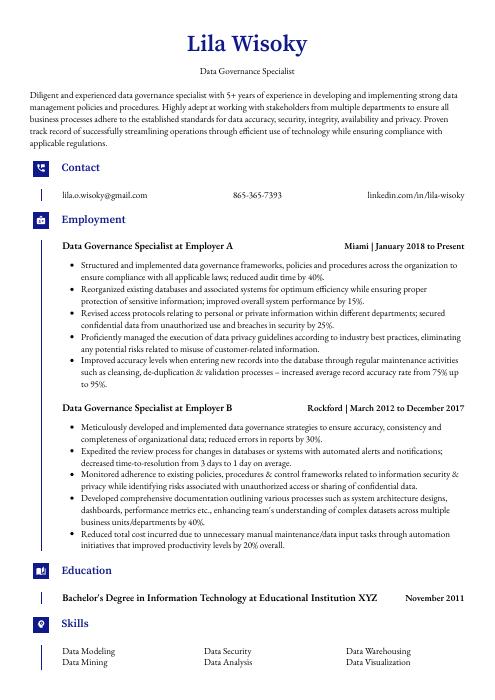 Gharial
Gharial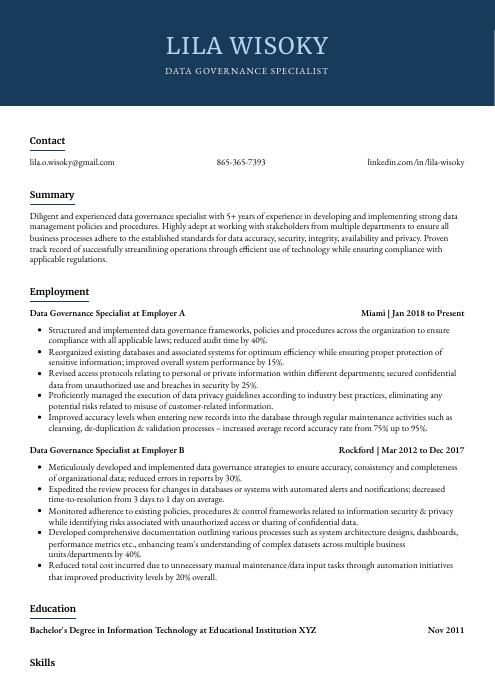 Bonobo
Bonobo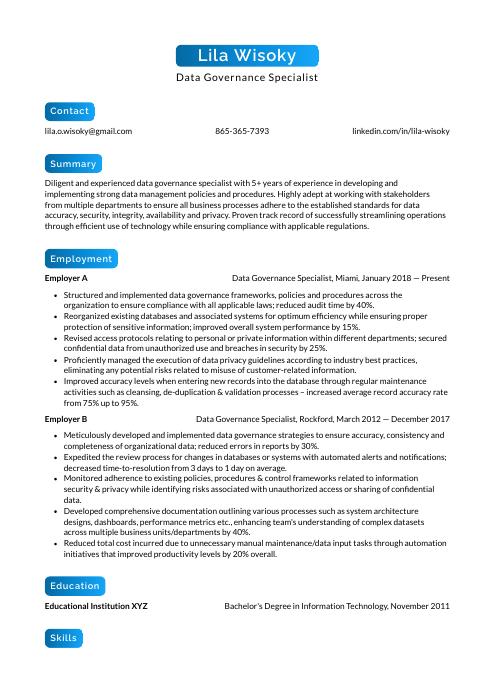 Kinkajou
Kinkajou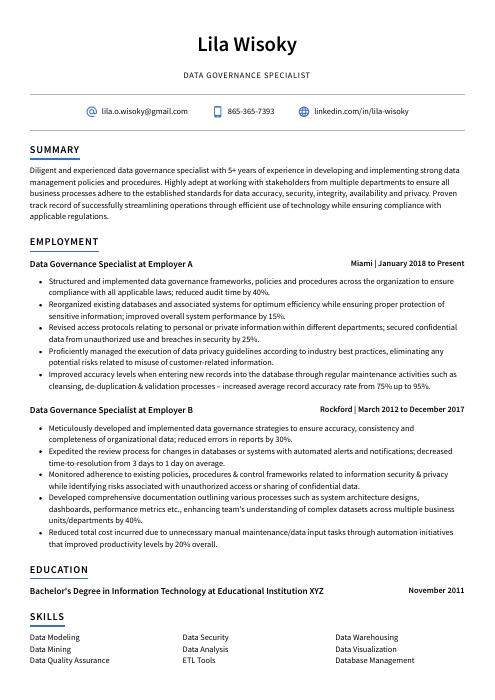 Axolotl
Axolotl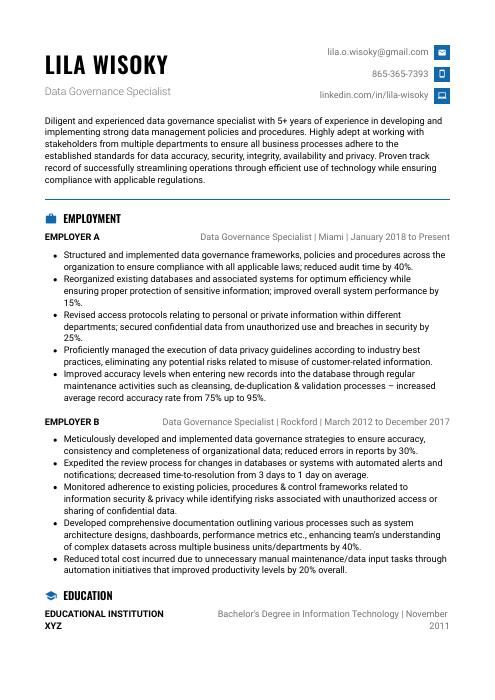 Echidna
Echidna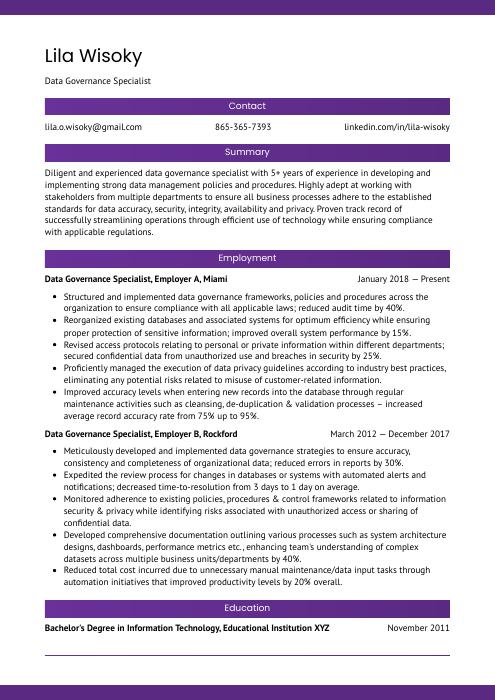 Jerboa
Jerboa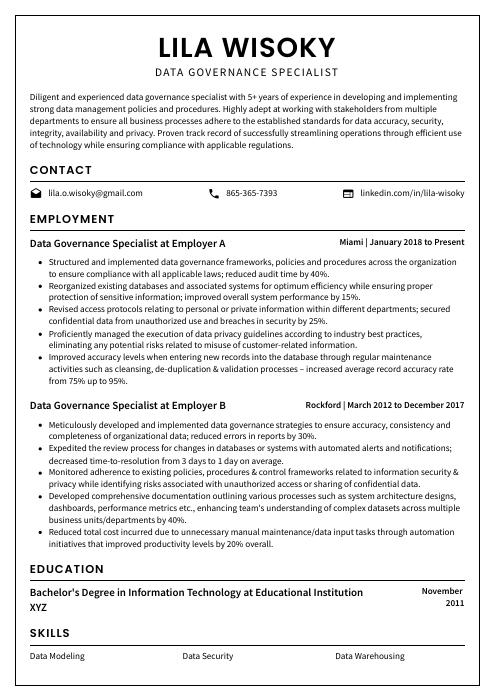 Cormorant
Cormorant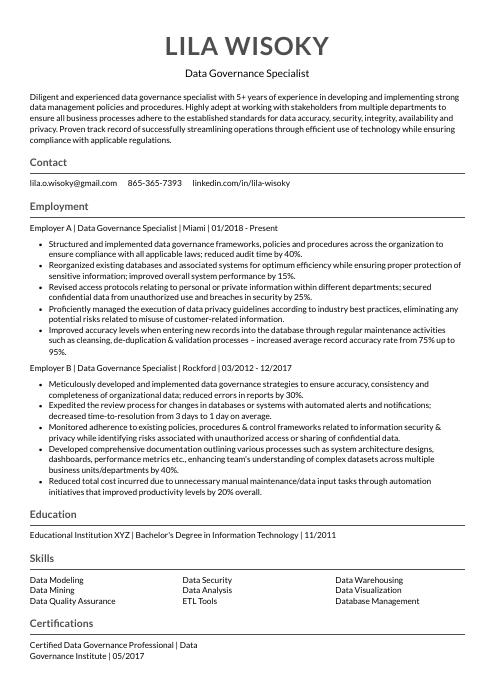 Indri
Indri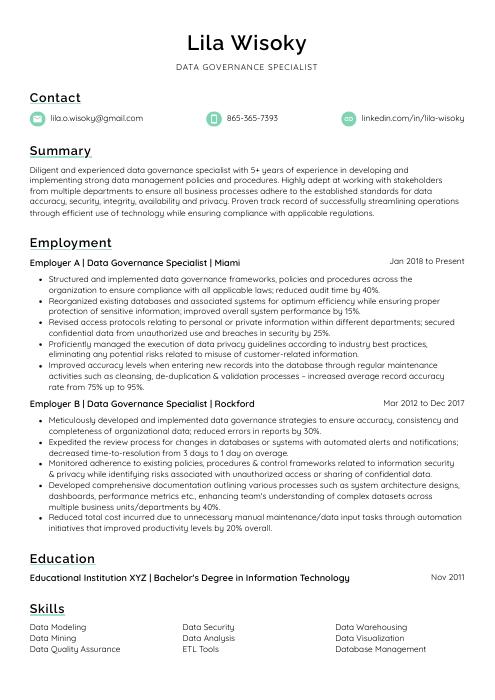 Lorikeet
Lorikeet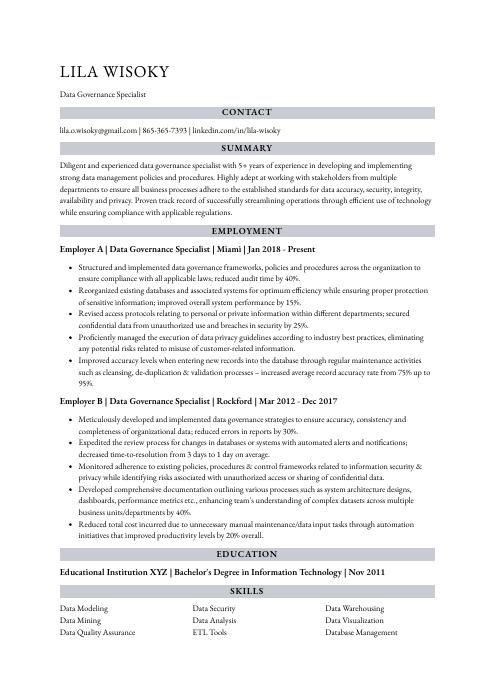 Numbat
Numbat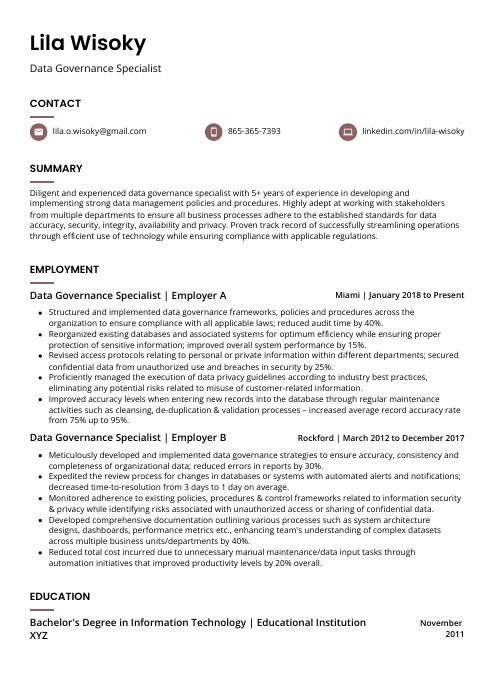 Fossa
Fossa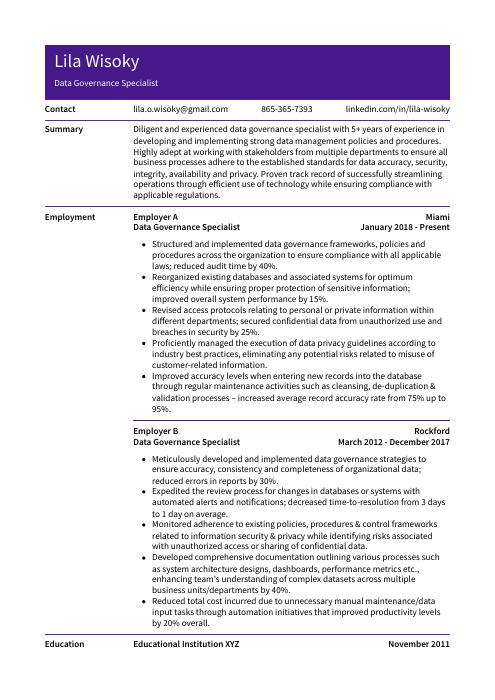 Pika
Pika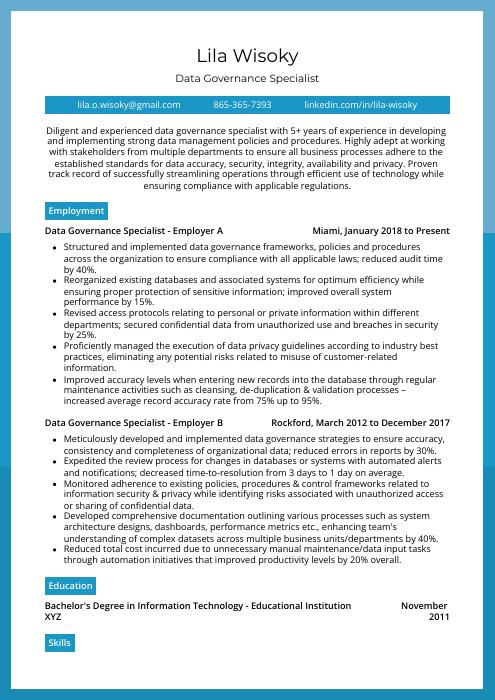 Rhea
Rhea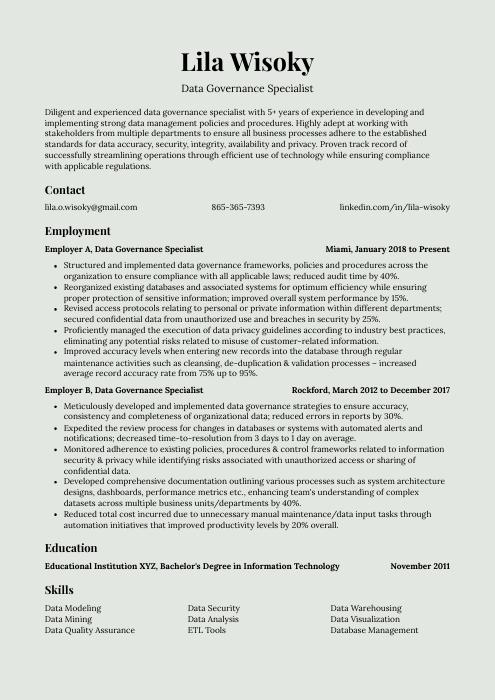 Saola
Saola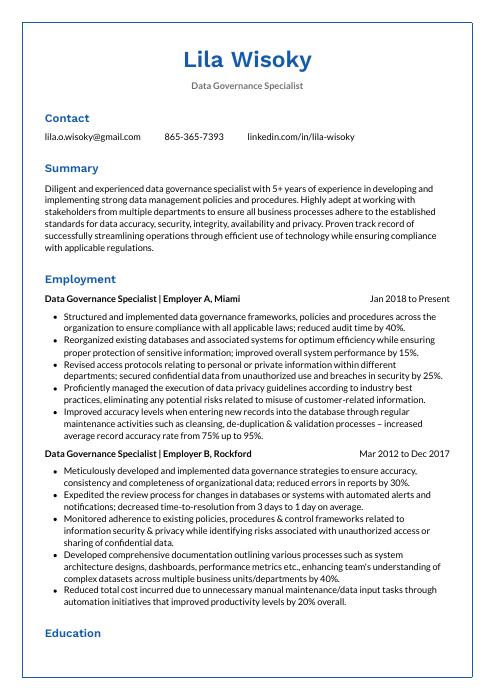 Markhor
Markhor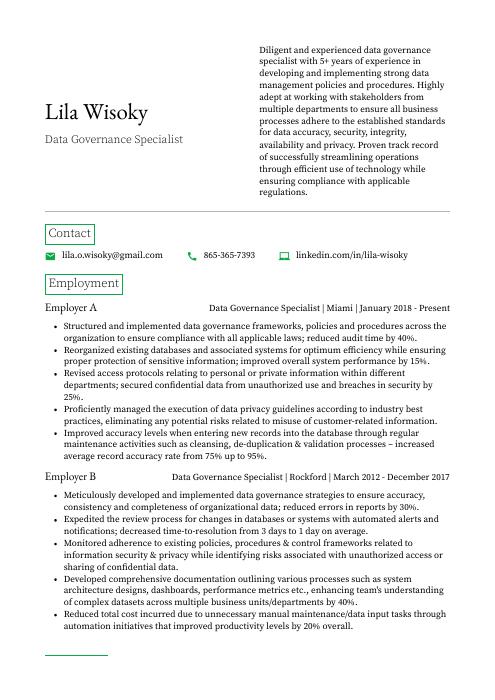 Quokka
Quokka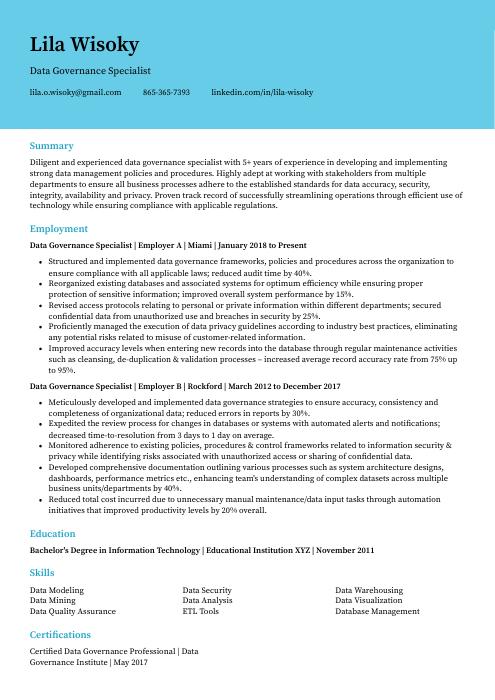 Dugong
Dugong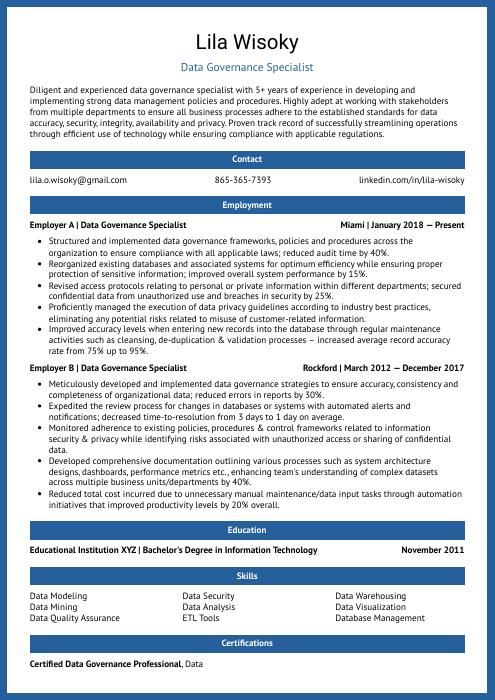 Ocelot
Ocelot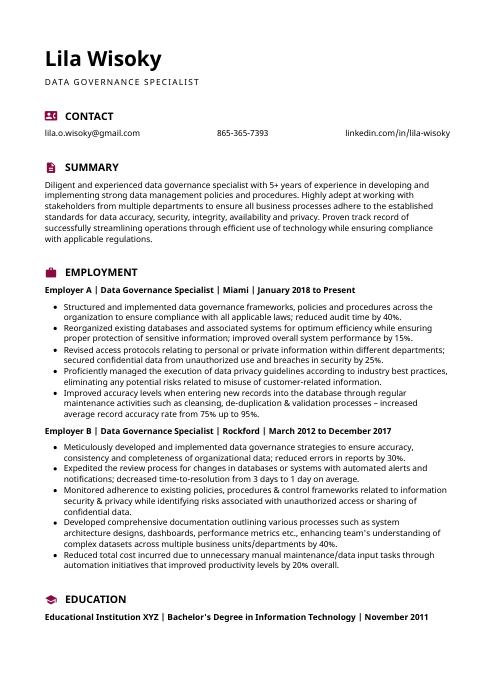 Hoopoe
Hoopoe Rezjumei
Rezjumei
